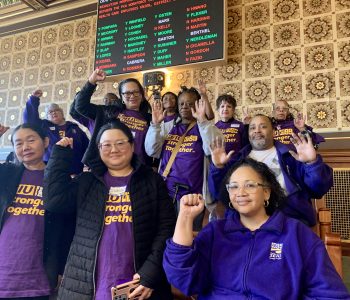 Press Releases
Press Releases
It’s time to expand health care services
As a public health and economic crisis affects all of us during this unprecedented moment in history, working people in Connecticut—Black, Brown, and White—are struggling for their very survival. More than 6,000 people in Connecticut have lost their lives due to the pandemic. Over 200,000 remain unemployed. Working-class communities, especially communities of color, are on the brink.
State health care workers and long-term care workers—disproportionately women and people of color—dedicate their lives to provide a safety net for our most vulnerable residents. Health care workers in state agencies—including the Departments of Mental Health and Addiction Services (DMHAS), Developmental Services (DDS), Corrections (DOC), Public Health (DPH), and Children and Families (DCF), and others—as well as workers in long-term care have demonstrated the ultimate courage by caring for marginalized populations. The people receiving these services are often at-risk children, people in need of substance abuse and mental health treatment, individuals with developmental disabilities, and the elderly. In providing care, thousands of these frontline workers have contracted the coronavirus—and dozens have sadly passed away from the disease.
Coronavirus exposed and exacerbated the devastating budget cuts made to our health care infrastructure over many years. State health care workers, long-term care workers, and the people they serve aware forced to grapple with chronic underfunding—and therefore a declining quality of care—long before the coronavirus appeared. In state agencies, cuts have caused a massive staffing crisis, leaving 1,000 positions unfilled and reducing care for the people who need it most. In nursing homes, group homes, and home care sector of long-term care services, a combination of underfunding, low wages, and unaffordable benefits create obstacles to recruitment, intensifying a longstanding staffing crisis.
Connecticut faces a choice: whether to continue cutting services to the bone at a time when they’re obviously needed more than ever, or to invest in the kind of robust and equitable health care infrastructure that our residents truly deserve by passing progressive taxation. State health care workers—proud members of 1199 New England—and leading community organizations demand improved and expanded services so the people of Connecticut can thrive with healthy lives.
We must expand the health care infrastructure that our communities need—now more than ever. This is an urgent matter of economic and racial justice.
To meet the needs of this moment, Connecticut must:
- Expand mobile crisis intervention services by the Department of Mental Health and Addiction Services (DMHAS) to be available 24 hours a day, 7 days a week in all five regions, and to respond to all 911 calls involving acute mental health emergencies. Mobile crisis intervention services shall be the default response to 911 mental health calls, dispatched directly through 911.
- Expand medical and mental health re-entry services to formerly incarcerated people (about 2,000 currently), a population that is disproportionately Black and Brown, as they re-enter our communities from prison or pre-trial detention.
- Make a commitment to Justice Reinvestment to end mass incarceration and eliminate racial disparities in Connecticut’s criminal justice system.
- Restore and expand DMHAS addictions services to address Connecticut’s mental health crisis and the growing waiting lists in request for services.
- Expand the continuum of housing supports available to all Connecticut residents, with targeted investments for adults and youth with substance abuse and mental health conditions.
- Expand respite services available to families caring for loved ones with developmental disabilities.
- Expand respite and other short-term stabilization services available to individuals with substance abuse and other mental health conditions.
- Fully fund essential services in DMHAS, DDS, DOC, DCF and DPH to address the critical staffing shortage crisis in these agencies.
- Fully fund long-term care, including affordable health care for caregivers, to ensure quality services and uplift home care workers, group home workers and nursing home workers out of poverty.
To see the video of the press conference on January 26, 2021 please click on the link below.
Quotes from legislators in support of expanding services:
“Connecticut needs to do a lot more than getting back to normal after the COVID pandemic in our health care and mental health infrastructure. I call on my fellow legislators to make a difference in this legislative session and in this budget for the people of Connecticut. Make a difference to make sure that we are funding and expanding state services that save and enrich people’s lives. Make a difference to protect all our communities, and I do mean all our communities, with equitable access to health care and mental health support.”
Rep. Robyn Porter, Hamden and New Haven
“When we talk about public health care and mental health services, we are talking about one of the most important missions of the state. This is not just about numbers on a spreadsheet and balancing a budget. These are children ailing for lack of treatment in a hospital bed, these are our elderly in a nursing home without sufficient care due to short-staffing schemes, these are prisoners missing out on timely mental health and addiction services so they can recover before returning to the open community. We have to fund these services as if our lives depended on it, because they do.”
Rep. David Michel, Stamford
“Mental health services are vital. They help Connecticut families in every town and in every city. We need to find solutions, and fund those solutions.”
Sen. Patricia Dillon, New Haven







